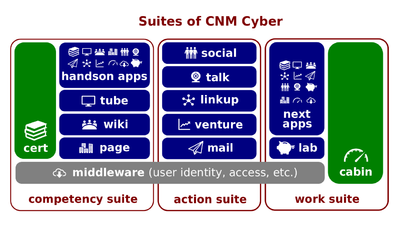Difference between revisions of "What Reporting Is"
(→Content) |
|||
| (48 intermediate revisions by 2 users not shown) | |||
| Line 1: | Line 1: | ||
| − | [[File:Cnm-digital.png|400px|thumb|right|[[ | + | [[File:Cnm-digital.png|400px|thumb|right|[[CNMCyber suite]]s]][[What Reporting Is]] (hereinafter, the ''Lectio'') is the [[lectio|lesson part]] of '''[[Technical Report Essentials]]''' [[lesson]] that introduces its participants to [[technical report]] concepts. This ''lesson'' belongs to the ''CNMCT Entrance'' section of [[CNMCyber Bootcamps]]. |
==Content== | ==Content== | ||
| − | The predecessor [[lectio]] is [[ | + | The predecessor [[lectio]] is [[What Test Case Is]]. |
===Script=== | ===Script=== | ||
| − | : | + | :A [[report]] is a description of events, or a lack of those, or a state of affairs that recipients of the report either requested or are willing to know. [[Reporting]] refers to those [[endeavor]]s that are undertaken to produce one or more ''reports''; however, not everyone who produces ''reports'' is a [[reporter]]. |
| + | |||
| + | :[[Reporter]]s discover data related to news events and report that [[reportable data]] to mass media such as TV and news websites. However, those individuals who are not called ''reporters'' produce fewer ''reports'' than those who are formally not ''reporters''. | ||
| + | |||
| + | :[[Accountant]]s and [[financial manager]]s produce [[financial report]]s that reflect [[financial data]] and financial standing of some entity. [[Top manager]]s have to report to the [[stockholder]]s and the [[government]]s. [[Engineer]]s, [[manager]]s, and [[operator]]s describe standing of equipment, logistics, orders, production, supplies, and other operational data. [[Sales representative]]s report about their interactions with the [[customer]]s. [[Scientist]]s report their research findings. ''Reporting'' is an essential part of pretty much any [[occupation]]. | ||
| + | |||
| + | :Three properties separate ''reports'' from casual communication messages. First of all, ''reports'' are factual; they represent facts rather than opinions or speculations. Secondly, ''reports'' are targeted. They address their particular audiences. [[Report completeness]] is the final property. Good ''reports'' are as complete as their ''completeness'' is possible and needed. | ||
| + | |||
| + | :In our digital age, electronic devices produce the overwhelming majority of ''reports'' automatically. For instance, the [[computing server]]s of [[Opplet]] routinely report to [[WorldOpp Middleware]] and the ''middleware'' reports its data back to the servers upon their requests. Each time you click on any website, your [[web browser]] reports your click to [[web server]]s. ''Traffic reports'' may aggregate millions of reports produced by GPS-powered equipment, cameras, and other sensors. | ||
===Key terms=== | ===Key terms=== | ||
| − | :[[ | + | :[[Report]], [[reporting]], [[reporter]], [[reportable data]] |
===Closing=== | ===Closing=== | ||
| − | : | + | :Write True or False: |
| + | :*Any description that represents opinions and speculations about a product may also be regarded as a [[report]]. | ||
| − | The successor [[lectio]] is '''[[ | + | The successor [[lectio]] is '''[[What Report Complete Is]]'''. |
==Presentations== | ==Presentations== | ||
Latest revision as of 09:20, 15 November 2023
What Reporting Is (hereinafter, the Lectio) is the lesson part of Technical Report Essentials lesson that introduces its participants to technical report concepts. This lesson belongs to the CNMCT Entrance section of CNMCyber Bootcamps.
Content
The predecessor lectio is What Test Case Is.
Script
- A report is a description of events, or a lack of those, or a state of affairs that recipients of the report either requested or are willing to know. Reporting refers to those endeavors that are undertaken to produce one or more reports; however, not everyone who produces reports is a reporter.
- Reporters discover data related to news events and report that reportable data to mass media such as TV and news websites. However, those individuals who are not called reporters produce fewer reports than those who are formally not reporters.
- Accountants and financial managers produce financial reports that reflect financial data and financial standing of some entity. Top managers have to report to the stockholders and the governments. Engineers, managers, and operators describe standing of equipment, logistics, orders, production, supplies, and other operational data. Sales representatives report about their interactions with the customers. Scientists report their research findings. Reporting is an essential part of pretty much any occupation.
- Three properties separate reports from casual communication messages. First of all, reports are factual; they represent facts rather than opinions or speculations. Secondly, reports are targeted. They address their particular audiences. Report completeness is the final property. Good reports are as complete as their completeness is possible and needed.
- In our digital age, electronic devices produce the overwhelming majority of reports automatically. For instance, the computing servers of Opplet routinely report to WorldOpp Middleware and the middleware reports its data back to the servers upon their requests. Each time you click on any website, your web browser reports your click to web servers. Traffic reports may aggregate millions of reports produced by GPS-powered equipment, cameras, and other sensors.
Key terms
Closing
- Write True or False:
- Any description that represents opinions and speculations about a product may also be regarded as a report.
The successor lectio is What Report Complete Is.
